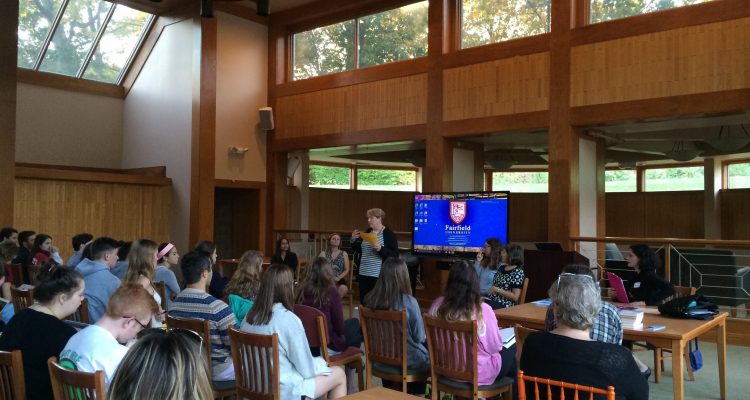Gender has played a big role in the 2016 Presidential Election thus far with Hillary Clinton potentially serving as the country’s first female president and Donald Trump recently being accused of sexually harassing several women. In response to the influence of sex and gender in the current election cycle, the University called for a panel discussing the issue.
Students gathered in the Faber Hall Dining Commons on Oct. 17 for a faculty panel regarding these issues. Once the seats were full, students began to sit on tables and crowd the floor to hear what the four professors had to say.
The panel consisted of politics professors Gayle Alberda, Gwendoline Alphonso and Jocelyn Boryczka, as well as English professor Sonya Huber.
Alberda began the discussion by talking about how intensely women are scrutinized in politics and the media. She discussed how women are considered untrustworthy for things as trivial as hair length or what they are wearing. Alberda brought up that the media coverage for the election would be different if the two nominees were both women.
“If the nominees were say, Carly Fiorina and Hillary Clinton, the media would get tired of focusing on their hair and outfits. They could have actually been more focused on their policies,” said Alberda.
Alphonso followed Alberda and discussed that sexual discrimination has tremendous potential to inspire women’s participation in politics. She brought up the 11-point lead Clinton gained in the swing state, Ohio after the videotape of Trump came out. Alphonso also explored the different kinds of womanhood that the parties promote.
Sophomore Michael Casarella was shocked at the huge lead Clinton gained.
“I knew Trump would definitely lose supporters because of his comments, but I would have never thought that Clinton would go up that much in the polls,” Casarella said.
Boryczka, discussed how Trump has taken the route of focusing on Clinton’s flaws rather than the structural issues that have to be resolved. She explored the blame that Trump consistently places on Clinton for issues such as terrorism and Obamacare, issues that Clinton is powerless to fix on her own. Boryczka said that his tactic diverts the attention from the real issues onto Clinton.
Additionally, Huber talked about how “gender in Hillary’s case is seen as a fraud; luring women to vote for her because of their shared gender.” She expressed the belief that Clinton’s gender plays a huge role in the amount of criticism she has received throughout the race. “[Clinton] is doing a brave thing by going into an environment where she will be attacked relentlessly regardless of what she does,” Huber said.
Sophomore Sabrina Musto disagreed with what Huber had to say. “I don’t think Clinton receives criticism because she’s a woman; she receives criticism because of all she’s done. I don’t think gender has anything to do with it,” Musto said.
The students and panelists thought that the panel went smoothly, despite the fact that it covered controversial topics.
“I thought the panel was very interesting. We weren’t sure how it was going to go,” said Alphonso. “It could have been very combative, but instead it was very civil and respectful. It was more empathetic rather than straightforward political science.”
The students in the audience had varying opinions on how they felt about the panel. Some students saw it as the ability to see things in a different light.
“I thought they talked about some good ideas. Talks like this are a good way for the campus and the American electorate to get the discussion started,” said James Poccia ‘19.
“It’s good to see what everyone’s thinking, even if you don’t 100 percent agree with it,” said Joey Schinella ‘19.
Other students felt that the conversation didn’t present enough neutral information and felt dissatisfied with the panel.
Freshman Kamryn Jebb only presented one side of the argument. “I wasn’t aware of the statistics regarding the bias toward women, but overall I felt the conversation was very one-sided,” she said.
“I felt that all the statistics about women in the media are things we’ve all seen before. The panel emphasized how important it is we come together as a nation, but no one presented the strategy of how we should actually come together,” said Kelsey Shockey ‘18.
Sophomore Justin Flayhan agreed with Jebb that the conversation was one sided.
“I thought the talk was completely biased. I thought they were putting words into our mouths saying we don’t trust Hillary because of her hair or her pantsuits, but I don’t trust her because of her 33,000 emails and Benghazi,” he said.
When asked if there was one thing the audience should take away from the panel, Alphonso said, “I think that women have a really important role to play and that women’s participation can transform politics. Women all have different opinions. Even though we all have different things to say, we shouldn’t be silenced.”


Leave a Reply